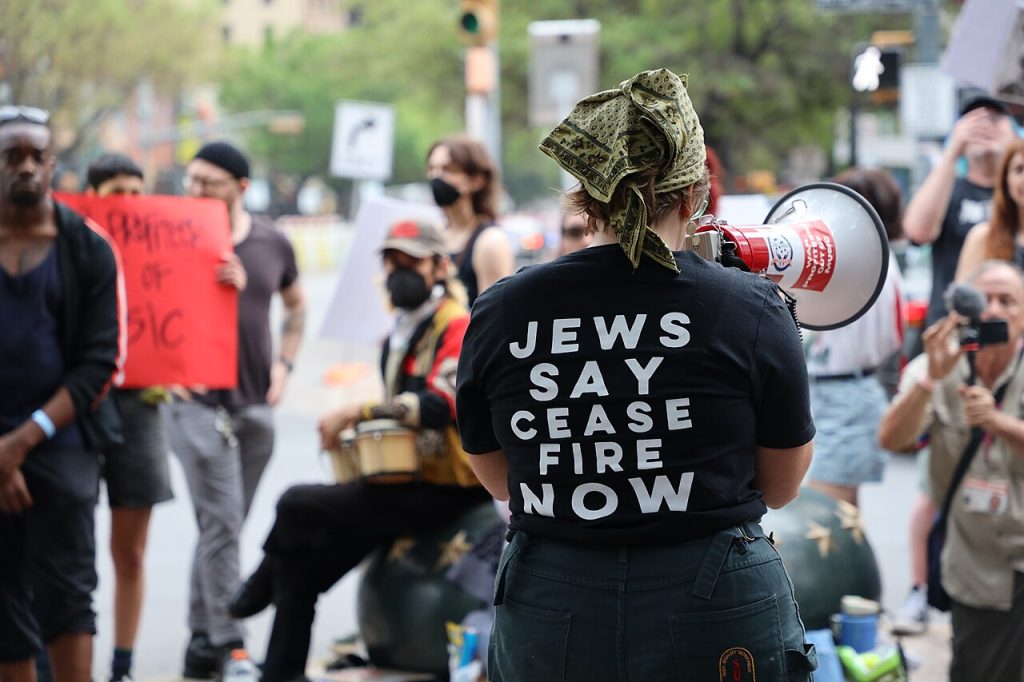
Let our political imaginations soar
Blätter für deutsche und internationale Politik 10/2025
Gaza and the age of impunity; Islamism and leftwing anti-Zionism; dead-ends of Staatsräson; illiberal rap.
Political failures since 7 October 2023 have had deep repercussions for Jews in liberal democracies. Not only are they divided over the Jewish state, they also feel alienated from societies in which antisemitism is regularly disguised as anti-Zionism, and in which the far-right has become Israel’s greatest champion.
It is possible to recognize historical events while they are unfolding, even if their significance is still difficult to evaluate. While October 7th does not have the magnitude of the fall of the Roman Empire or the Industrial Revolution, it bears the characteristics of a ‘big’ event. A big event is one that has major objective consequences for the parties involved; it is one that is known to be significant by its participants; and it is one that has a ‘before’ and an ‘after’.
October 7th meets all these conditions. It was experienced by Israelis and stateless Palestinians alike as the most dramatic event in living memory. Worldwide, it has marked a profound rupture in Jews’ perceptions of their own relationship to modernity. And in hindsight, it may have been the cause for a flickering light of hope in this dark region, even if the outcome of the ceasefire and the Trump 20 points program remains to be seen. As is sometimes the case in life and world affairs, disaster and hope go hand in hand.
Indeed, some positive things have happened. The first is the fatal blow that Israel and the USA have inflicted on Iran. The noxious and criminal role that Iran has played in inflaming the region cannot be overestimated. The military weakening of Iran, that state-sponsor of terrorism throughout the world, together with the formation of a security alliance between Israel, the UAE, Saudia Arabia, Jordan, Bahrain, Egypt and Qatar, are likely to transform the region.
The second good thing to have happened is the involvement of Arab countries in the conflict. For the first time, the UEA, Egypt, Saudia Arabia and the Qatar have felt responsible for helping engineer a cease-fire between Israel and the Palestinians. This will help take the resolution of this conflict to a regional level, thereby perhaps guaranteeing an enduring peace.

Washington, 14 March 2024. Image Kevin Payravi / Source Wikimedia Commons
However, October 7 has another lesson: progressive public opinion and Israel’s leadership have both been dismal.
The intensity of the interest elicited in western countries by this conflict should astonish us. Never before has a humanitarian disaster caused by a war not involving European or American soldiers agitated so many protesters so intensely, or prompted condemnation from world leaders comparable to that of Pedro Sanchez, Lula da Silva, Nicolaś Maduro or Gustavo Pedro. This would have been good news for the world, were it to have meant that those same people and same leaders were as deeply involved with and outraged by the equally unfathomable tragedies in Sudan, Congo, Ethiopia, Kenya, Yemen and elsewhere. Alas, the fate of the Palestinians seems to be the only one capable of moving and captivating such crowds. Palestine has emerged as a metonym and epitome of all other progressive causes. Yet its champions have often showed a woeful lack of knowledge and understanding of the region.
October 7th has seen the rise of two lefts: the Gaza left and the Shoah left, whose split roughly overlaps with the distinction between the progressive and the social democratic left. Israel and Palestine have become the crystallization point for a broader set of issues and debates concerning the (il)legitimacy of violence, the replacement of universalism by identity politics, the competition between the memory of colonialism and the memory of the Shoah, and the privileging of justice over reconciliation.
Reactions in the West to October 7th and its consequences have marked the outward expression of a prior redrawing of moral and political maps, while accentuating these transformations yet further. Not only has it driven a sharp wedge between these two types of Left and alienated many Jews in western democracies, it has also strengthened the extreme right, almost everywhere.
The Gaza left has spectacularly failed at the task and vocation of the left. A true left would have relentlessly worked at mitigating, mediating, serving as a bridge between the badly traumatized Israelis and Palestinians. But rarely has the left, including the commentariat that accompanies it, failed so spectacularly at its task. Instead of helping us understand, explain, bring complexity and nuance to the tragedy, many leftwing politicians, influencers, commentators, artists, filmmakers and novelists have fanned the flames of an already blazing conflict.
Instead of building bonds of solidarity with the groups inside Palestinian and Israeli societies that want peace, instead of making each side intelligible to the other, instead of offering an alternative to the rhetoric of war, instead of strengthening the ideal of peace, and instead of thinking about the mechanisms and institutions that could help overcome a century-old hostility, many on the left have doubled down on the rhetoric of war, adding a new layer of hatred to an old one. They have treated this tragedy as a Hollywood movie, one with victims on one side and perpetrators on the other. Moral purity and self-righteousness have barely hidden the hatred that all too often has been the animating spirit of the Gaza left.
Netanyahu too has behaved so appallingly that the antipathy his person seems to uniquely generate has extended to Israel itself, as a country. He refused to disavow the policy that induced Hamas to commit its crimes; he refused to take responsibility for failing to heed the warning signals; he doubled down on his corruption of the state apparatus by hiring loyalists at the helm of the army and the secret services; and he prosecuted a war that was oblivious to world public opinion, to Palestinian misery and to the despair of the families of Israeli hostages. Netanyahu deserves to be judged harshly by history. Because of him, Israel will have difficulties in rehabilitating its status and image.
As a result of these two monumental failures, the situation of Jews in liberal democracies has drastically changed in at least three ways. The post-World War II moral order marked perhaps the Golden age for Jewish communities. Even though antisemitism was still simmering below the surface, Jews were ‘protected’ by the memory of the Shoah. Everywhere in the western world, they espoused the liberal agenda wholeheartedly. But they now feel, if not like strangers, then at least uncomfortably disarticulated from societies in which expressions of antisemitism have become routine under the guise of leftwing anti-Zionism. The long marriage between Jews and various forms of universalism – liberal, social democratic, socialist, communist – has come to an end.
The second change is that, while Israel’s status among Jews themselves shifted from quasi-hegemonic to controversial after the 1973 Yom Kippur War, it has now become a source of sharp division between those whose identity is shaped by Israel and those increasingly committed to progressivism. The question of nationalism and Israel splits Jews in a way that has no precedent in recent history.
In a Pew survey of February 2024, a significant partisan gap exists among Jewish Americans regarding the Israeli government: 85% of Jewish Republicans and Republican-leaners expressed a favourable opinion, compared with only 41% of Jewish Democrats and Democrat-leaners. For a majority of Jews, their political opinion determines their allegiance to the Jewish state. But the divide runs much deeper than a simple difference of opinion. It expresses two opposite routes and fundamentally different definitions of Jewishness; and it is likely to split the Jewish people into two different branches that have little in common.
The divide will also ultimately cause a shift in American politics. This is already palpable in New York City, where more than 40% of Jews favour electing a pro-Palestinian mayor. But the move away from Israel is taking place not only among Jewish Democrats. Never have so many Republicans, both Jews and non-Jews, been so sceptical about and even opposed to unconditional help to Israel. This possibly signals a fundamental shift of American policy on Israel (Marjorie Taylor Green or Tucker Carlson are examples).
The third and perhaps most perplexing change is that in many democracies, antisemitism is now most vocally opposed by the extreme right. This is true in the United States, the UK, France, Spain, Brazil and not least Germany. Many quarters of the left have shamefully declared antisemitism to be a non-issue, thus leaving this terrain wide open to their opponents. But the shift is also because the extreme right identifies with Israel’s political model of ethnic democracy and has endorsed its war on terrorism (Iran and its proxies). Netanyahu has been particularly apt at forging political alliances with members of the international extreme right, both antisemitic and not. He has also succeeded in casting the Israeli-Palestinian conflict as a war of civilization in which Israel protects the West.
This is very bad news. Historically, the extreme right has been the breeding ground of modern antisemitism. Because of the desertion and abyssal failure of the progressive left, Jews are finding respite and comfort in it today. But this will be like Othello taking shelter with Iago. The beast will re-awaken.
The weaponization of antisemitism both by the Trump administration and the Israeli government, in order to silence criticism and to police, punish and control universities, will leave a lasting stain on the struggle against antisemitism. That many Zionist Jews now consider the extreme right as their ally only goes to show how beleaguered they are, and how chaotic and confused the ideological sphere in general has become.
October 7th marked the collapse of our semantic categories: genocide, resistance, violence, war, democracy, left, right, racism, colonialism, antisemitism – all have lost their meaning. What October 7th has marked is the demise of our public sphere, whose vocation now seems to be to deprive words of their meaning. Steven Bannon, the MAGA eminence grise, had a name for this: ‘flooding the zone’. October 7th has elevated moral and political jibberish to new heights. Alongside the task of helping two populations overcome their traumas, we need to reconstruct the meaning of the words that historically have carried democracy forward. This will require patience and vision.
Published 14 October 2025
Original in English
First published by Süddeutsche Zeitung 07.10.2025 / Eurozine (revised English version)
© Eva Illouz / Eurozine
PDF/PRINTSubscribe to know what’s worth thinking about.

Gaza and the age of impunity; Islamism and leftwing anti-Zionism; dead-ends of Staatsräson; illiberal rap.

A century after publication, ‘Mein Kampf’ is instructive not just of the mass appeal of delusional xenophobia, but also of the circumstances under which morality can become a form of terror.